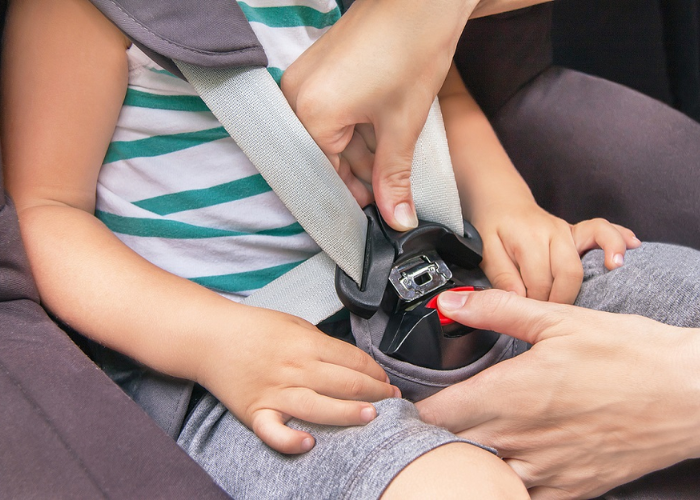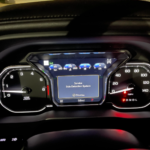NC Booster Seat Laws are an important part of keeping children safe while in a vehicle. Booster seats are designed to provide additional support for a child’s body and are designed to reduce the risk of serious injury in a crash. In North Carolina, there are specific laws that govern the use of booster seats and other child safety restraints. Understanding these laws will help ensure you are keeping your child safe while driving.
Who is Subject to NC Booster Seat Laws?
North Carolina’s booster seat laws require that children under eight years of age and under 80 pounds must use a booster seat when riding in a vehicle. The law applies to all vehicles, including cars, vans, SUVs, and trucks.
The booster seat must be used in the back seat of the vehicle. The law also requires that the booster seat must be properly secured in the vehicle with a lap and shoulder belt. The purpose of the law is to ensure that children are properly restrained in a vehicle, thus providing them with the best possible protection in the event of an accident.
Who is subject to NC booster seat laws? All children under the age of eight and weighing less than 80 pounds must be properly restrained in a booster seat when riding in a vehicle. The law applies to all vehicles, including cars, vans, SUVs, and trucks.
The booster seat must be properly secured in the vehicle using a lap and shoulder belt. The law does not apply to children who are eight years of age or older and weigh more than 80 pounds.
Types of Car Seats for Children in North Carolina
North Carolina has specific booster seat laws for children under the age of 8 and under 80 pounds. The state requires that children in this age and weight range must be secured in a booster seat when traveling in a motor vehicle.
Booster seats provide extra protection for children by raising them up to the level of the vehicle’s seatbelt, which helps the belt fit securely and properly across the child’s body. There are several types of booster seats available for children in North Carolina.
Rear-facing convertible seats can be used for infants while forward-facing convertible seats are for toddlers. Combination seats are for children who weigh more than 40 pounds, and high-back booster seats are for children over 40 pounds who are too tall for a combination seat.
It is important to note that all booster seats must meet Federal Motor Vehicle Safety Standards to be used in North Carolina.
State-by-State Comparison of NC Booster Seat Laws
When it comes to NC booster seat laws, the regulations vary from state to state. In North Carolina, children who are under the age of eight and less than 80 pounds must use a booster seat when riding in a motor vehicle.
The booster seat must be equipped with a shoulder and lap belt. The seat must be used in a forward-facing position. Additionally, all children under the age of thirteen must ride in the back seat, and the front seat is only allowed if all rear seats are occupied.
Depending on the state, the height and weight requirements for booster seats may be different. For example, in some states, the requirement is that children must be both under the age of eight and at least 4’ 9” tall in order to be exempt from using a booster seat.
It is important to be aware of the laws in each particular state to ensure the safety of children while traveling.
Exceptions to NC Booster Seat Requirements
In North Carolina, the law requires all children under 8 years of age to use a booster seat while riding in a motor vehicle. However, there are a few exceptions to this rule. Children who weigh more than 80 pounds or are taller than 4’9″ are not required to use a booster seat.
Additionally, children who are older than 8 but younger than 12 years of age and who weigh more than 80 pounds may be allowed to use a seat belt without a booster seat, if the seat belt fits properly.
Furthermore, any child who has a medical condition that would prevent them from using a booster seat may be exempt from the requirement. It is important to note that these exemptions are only allowed if the child is riding in a vehicle that is equipped with lap and shoulder belts, and if the lap belt fits properly across the child’s hips and not the stomach.
Consequences for Breaking NC Booster Seat Laws
When it comes to the consequences of breaking North Carolina’s booster seat laws, the penalties can be severe. Depending on the situation, a driver who fails to comply with the state’s laws regarding booster seats may face a fine of up to $25.
Additionally, the driver may receive a citation for a seat belt violation. This can lead to additional fines, court costs, and other fees. In some cases, a driver may be charged with a misdemeanor for failing to comply with the state’s booster seat laws. If convicted, the individual may face jail time, probation, and other penalties.
To avoid these consequences, drivers should make sure they and their passengers are properly buckled up and that all children under eight years old are in an appropriate booster seat. Additionally, all passengers should be buckled up, regardless of age.
Drivers should also make sure that all booster seats are properly installed and used according to the manufacturer’s instructions. By following these guidelines, drivers can help to ensure the safety of themselves and their passengers, while avoiding the consequences of breaking North Carolina’s booster seat laws.
Conclusion
The North Carolina Booster Seat Laws are a necessary step in maintaining the safety of our children while they are on the road. The law requires that children under the age of 8 must be restrained in an appropriate booster seat or car seat, while children between 8 and 16 must be properly restrained with a seat belt.
This law ensures that our children are secure while traveling and are not at risk of serious injury or death in the event of a crash. Although it may be inconvenient for some, it is ultimately a small price to pay for the safety and protection of our children.
- Alternatives to Booster Seats
- Recent Changes to NC Booster Seat Laws









